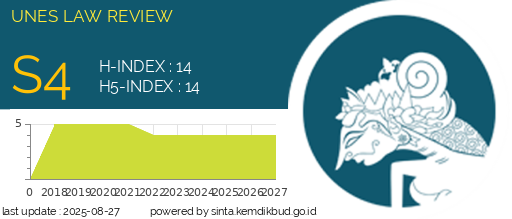Tanggung Jawab Pemegang Protokol Notaris Terhadap Gugatan Pemalsuan Akta Otentik
DOI:
https://doi.org/10.31933/unesrev.v6i2.1314Keywords:
Responsibility, Notary Protocol, DeedAbstract
In essence, a notary as a public official has the authority to make deeds authentic in accordance with norms, values and provisions of laws and regulations applicable so that the law can work in society. Every deed made by the notary must be kept in the notary's protocol, and the protocol must be transferred in the case of the notary died or his term of office has expired or retired. The existence of a lawsuit addressed to the notary protocol holder regarding the forgery of authentic deeds that have been transferred to him will become a problem in the future. The notary who receives the protocol will still be summoned for information if there are problems related to the protocol in his control, because this is one of the responsibilities of the notary protocol recipient. Article 65 of the Notary's Position Law explains that a notary is responsible for every deed he makes even though the Notarial Protocol has been submitted and transferred to the party holding the Notarial Protocol. The notary holding the Protocol only has the obligation to care for and maintain the deed that has been submitted to him, and is not responsible for the contents of the deed. The storage of notary protocols as state archives is also not regulated in detail in the Notary Public Law. So there needs to be special arrangements regarding policies, guidance and management of notary protocols. In order to create legal certainty for notaries in storing and maintaining notary protocols.
Downloads
References
Abdul Ghofur, 2009, Lembaga Kenotariatan Indonesia: Perspektif Hukum dan Etika, Yogyakarta: UII Press,
Andi Mamminanga, 2008, Pelaksanaan Kewenangan Majelis Pengawas Notaris Daerah dalam Pelaksanaan Tugas Jabatan Notaris berdasarkan UUJN, Tesis, Fakultas Hukum Universitas Gadjah Mada, Yogyakarta,
Departemen Pendidikan Nasional, 2008. Kamus Besar Bahasa Indonesia, Jakarta: Gramedia Pustaka Utama,
Habib Adjie. 2008. Hukum Notaris Indonesia Tafsir Tematik Terhadap UU No.30 Tahun 2004 Tentang Jabatan Notaris. Bandung: Refika Aditama,
Ridwan HR, 2008, HukumAdministrasiNegara, Jakarta: Raja Grafindo Persada,
Aprilia Hanastuti, 2016, ”Pertanggungjawaban dan Perlindungan Hukum Bagi Notaris Penerima dan Penyimpan ProtokolNotaris”, Jurnal Repertorium, III(1),
Eko Permana Putra, 2019. “Kedudukan dan Tanggungjawab Notaris Penerima Protokol Notaris Yang Meninggal Dunia”, Jurnal Hukum Islam, 5(1)
Patricia Audrey Ruslijanto, 2021, ” Tanggung Jawab Notaris Terhadap Akta Yang Cacat Hukum Dan Tidak Sesuai Dengan Ketentuan Pembuatan Akta Dalam Undang-Undang Jabatan Notaris” Jurnal Bima Mulia Hukum, 6 (1) ,
Downloads
Published
How to Cite
Issue
Section
License
Hak cipta :
Penulis yang mempublikasikan manuskripnya di jurnal ini menyetujui ketentuan berikut:
- Hak cipta pada setiap artikel adalah milik penulis.
- Penulis mengakui bahwa UNES Law Review berhak menjadi yang pertama menerbitkan dengan lisensi Creative Commons Attribution 4.0 International (Attribution 4.0 International CC BY 4.0) .
- Penulis dapat mengirimkan artikel secara terpisah, mengatur distribusi non-eksklusif manuskrip yang telah diterbitkan dalam jurnal ini ke versi lain (misalnya, dikirim ke repositori institusi penulis, publikasi ke dalam buku, dll.), dengan mengakui bahwa manuskrip telah diterbitkan pertama kali di Jurnal UNES Law Review.


















